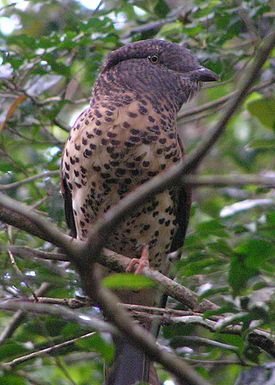Cavitaves (лат.) — клада новонёбных птиц, включающая пять отрядов: куролообразных, а также трогонообразных, птиц-носорогов, ракшеобразных и дятлообразных, объединяемых в кладу Eucavitaves[1][2][3][4][5][6]
| Cavitaves | ||||
|---|---|---|---|---|
 Курол | ||||
| Научная классификация | ||||
|
Домен: Царство: Подцарство: Без ранга: Без ранга: Тип: Подтип: Инфратип: Надкласс: Клада: Клада: Класс: Подкласс: Инфракласс: Клада: Клада: Клада: Клада: Cavitaves |
||||
| Международное научное название | ||||
| Cavitaves Braun & Kimball, 2013 | ||||
| Отряды | ||||
| ||||
Филогения
править| Cavitaves |
| ||||||||||||||||||||||||
Примечания
правитьЭто заготовка статьи по орнитологии. Помогите Википедии, дополнив её. |
- ↑ Hackett, S.J.; et al. (2008). "A Phylogenomic Study of Birds Reveals Their Evolutionary History". Science. 320 (5884): 1763—8. Bibcode:2008Sci...320.1763H. doi:10.1126/science.1157704. PMID 18583609. S2CID 6472805.
- ↑ Ericson, P.G. (2012). "Evolution of terrestrial birds in three continents: biogeography and parallel radiations" (PDF). Journal of Biogeography. 39 (5): 813—824. Bibcode:2012JBiog..39..813E. doi:10.1111/j.1365-2699.2011.02650.x. S2CID 85599747.
- ↑ Naish, D. (2012). «Birds.» Pp. 379—423 in Brett-Surman, M.K., Holtz, T.R., and Farlow, J. O. (eds.), The Complete Dinosaur (Second Edition). Indiana University Press (Bloomington & Indianapolis).
- ↑ Yuri, T.; Kimball, R.T.; Harshman, J.; Bowie, R.C.K.; Braun, M.J.; Chojnowski, J.L.; Han, K.-L.; Hackett, S.J.; Huddleston, C.J.; Moore, W.S.; Reddy, S.; Sheldon, F.H.; Steadman, D.W.; Witt, C.C.; Braun, E.L. (2013). "Parsimony and model-based analyses of indels in avian nuclear genes reveal congruent and incongruent phylogenetic signals". Biology. 2 (1): 419—444. doi:10.3390/biology2010419. PMC 4009869. PMID 24832669.
- ↑ Kimball, R.T.; Wang, N.; Heimer-McGinn, V.; Ferguson, C.; Braun, E.L. (2013). "Identifying localized biases in large datasets: A case study using the avian tree of life". Molecular Phylogenetics and Evolution. 69 (3): 1021—1032. doi:10.1016/j.ympev.2013.05.029. PMID 23791948.
- ↑ Jarvis, E. D.; Mirarab, S.; Aberer, A. J.; et al. (2014). "Whole-genome analyses resolve early branches in the tree of life of modern birds". Science. 346 (6215): 1320—1331. Bibcode:2014Sci...346.1320J. doi:10.1126/science.1253451. PMC 4405904. PMID 25504713.